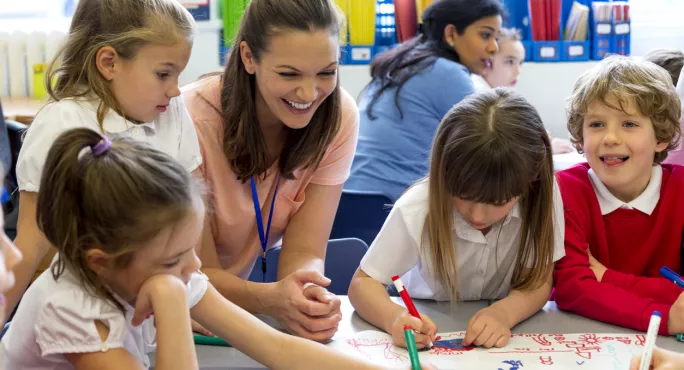- Home
- 10 ways to encourage creativity in the classroom
10 ways to encourage creativity in the classroom

Ten key ways to shape an education system that prioritises “teaching for creativity” have been outlined in a new report, published today.
The research, published by the Durham Commission on Creativity and Education, aims to kick-start a “real shift in educational policy” and looks at all disciplines - rather than focusing exclusively on traditional arts subjects.
Viewpoint: Don’t set homework - get students to find a new hobby
Policy: ‘We are driving out creative teachers,’ says Pisa boss
Survey: Creativity ‘undervalued’ in music education
Among the recommendations published by the commission, which is a joint research project between the Arts Council and Durham University, are proposals for digital skills to form part of the curriculum; a new examination framework that recognises the value of innovative thinking; and a focus on creativity in early years.
The 10 key recommendations are:
- Schools should team up to share ideas
A “national network” of creative schools, led by teachers for teachers, should be established - funded by a consortium including the Department for Education (DfE), Arts Council and educational trusts. These “creativity collaborative schools” would work together to nurture innovation in the classroom.
- Examiners should recognise the value of creativity
The government, Ofqual and awarding bodies should consider how creativity is recognised and rewarded in assessment frameworks.
- Inspectors should reward creative schools
Schools that have successfully nurtured creativity should be recognised in the Ofsted inspection process.
- English schools should participate in Pisa research
The DfE should support English schools’ participation in the Pisa 2021 evaluation of creative thinking, in order to influence and shape future use of the framework.
- Universities should research creativity
Higher education institutions, alongside the DfE, should work with the new network of creative schools to evaluate innovation in the classroom.
- Children need digital skills
The education system should support young people to engage creatively and critically with the digital technology that is now a significant part of their everyday lives.
- Arts and culture should be an essential part of the curriculum
The DfE should establish a funded National Plan for Cultural Education, which ensures that all children can access cultural opportunities in school. It should also require schools to offer a full national curriculum at all key stages, in which the arts are featured as a “substantive part” and not an “add-on”.
- Creativity should be encouraged in early years
The DfE should integrate creativity into the Early Years Foundation Stage (EYFS), to be operational from 2021.
- Children should be taught creative skills outside of school hours
In-school opportunities to develop creativity should be complemented by extracurricular activities.
- Qualification frameworks should reflect the value of a creative workforce
The Institute for Apprenticeships and Technical Education should review the current opportunities for developing creativity as a key capacity in emerging T-level qualifications and existing apprenticeship standards.
Prioritising teaching for creativity
The report states: “More often than not, we are failing to show young people how their hard-won knowledge can be creatively applied to help them lead more fulfilling lives and influence our changing world for the better.
“Teaching for creativity is becoming a global phenomenon. Countries such as Finland, Australia, Singapore and Canada are evolving creativity-focused education systems to future-proof their prosperity.
“But in England, we have not yet given creativity the priority that is required to meet our future needs, or indeed given our children the opportunities they deserve.”
Sir Nicholas Serota, chair of Arts Council England, said: “The current knowledge-based education system only goes so far in equipping young people with the skills that will give them the confidence and resilience to shape their lives.
“We must prioritise teaching for creativity, in addition to arts in the curriculum, to meet our future needs and give children the opportunity to fulfil their potential. It is our ambition that the Durham Commission report and recommendations lay the foundation for future work, for a long-term shift in educational policy and practice.”
Professor Alan Houston, pro-vice-chancellor (Education) at Durham University, said: “The findings of our research show that creativity and creative thinking are important for young people’s rounded development, not just in arts subjects but across all disciplines. However, it is also clear that more can be done to nurture this, particularly for young people from disadvantaged backgrounds.
“We hope that the report and the commission’s recommendations can lead to positive changes for creativity and creative thinking in our education system.”
The commission will report on its progress in autumn 2020.
Keep reading for just £1 per month
You've reached your limit of free articles this month. Subscribe for £1 per month for three months and get:
- Unlimited access to all Tes magazine content
- Exclusive subscriber-only stories
- Award-winning email newsletters



